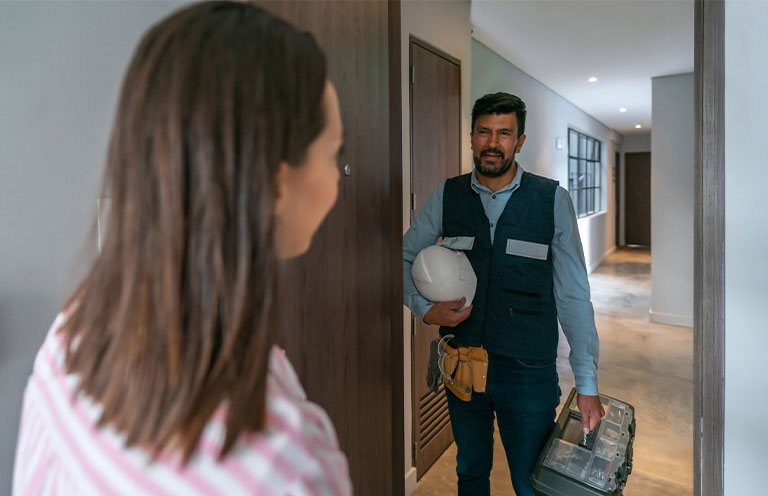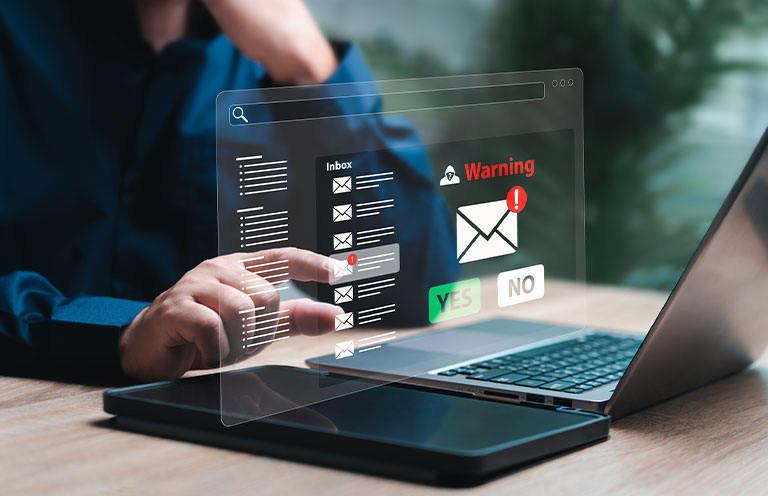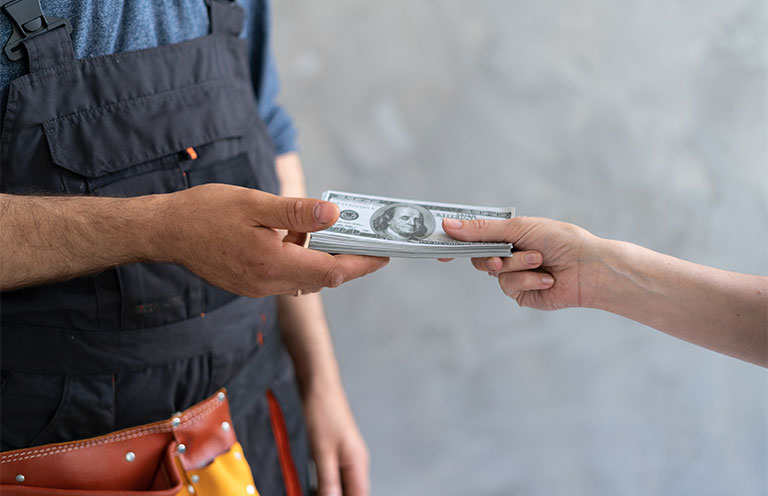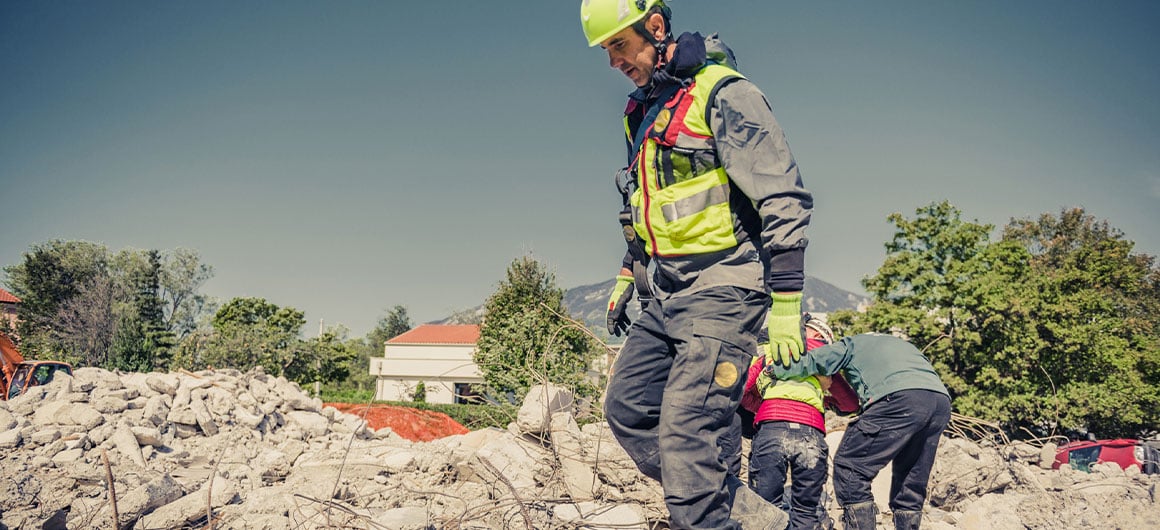
When weather disasters strike, people step up to help—but so do scammers looking to take advantage and pocket a quick buck. In 2024 alone, the FBI’s Internet Crime Complaint Center received 4,500 reports of fake charities, crowdfunding scams, and fraudulent disaster relief campaigns, costing victims nearly $96 million in losses. Scammers prey on urgency, vulnerability, and kindness, making it difficult to distinguish the difference between genuine aid and a slyly crafted con.
Fortunately, there are ways to protect yourself and others. Here’s how to spot post-disaster scams to avoid being conned and ensure that your donations truly help those in need.
Common scams after severe weather
The Federal Communications Commission has identified these as the top scams that imposters use to steal your money and disrupt your peace of mind.

Phony repair or utility scams
Scammers posing as repair workers or utility employees operate year-round but can become especially aggressive after a major storm or disaster. They might call or show up at your door, claiming they need to fix or replace something—and demand payment upfront.
Don’t fall for it. Real utility workers always carry identification and will never ask for money on the spot. It’s best to verify their claims by contacting your utility company directly before agreeing to anything.
Fake FEMA or government disaster assistance scams
If someone claiming to be a government official asks for money, it’s a red flag. Legitimate government agencies such as FEMA and the Small Business Administration (SBA) will never call, text, or email you to request your personal or financial information. They also don’t charge fees for disaster aid.
If a government worker comes to your home, ask to see their ID. Real officials must carry identification and will never ask for or accept money.
Also, be wary of scams over the phone. Fraudsters are known to use a tactic called spoofing, which makes their phone number appear official on caller ID. If you receive a suspicious call—even if the number looks legitimate—hang up and contact the agency directly through its official website.

Fake charities and donation scams
Some scammers exploit disasters by creating fake charities. They claim to be collecting donations to support disaster relief efforts—but pocket the money instead. These bogus charities are easy to fall for since they play on your emotions.
Before donating, verify that the charity is legitimate. These websites can help:
Additionally, check whether the charity is officially registered in your state through the National Association of State Charity Officials.
Because many charities solicit donations online, be especially cautious when responding to requests via email or social media:

Watch out for phishing emails.
Scammers use emails with malicious links or attachments to steal personal information or spread malware. If you receive an unsolicited donation request, avoid clicking links, and verify the organization through official sources.
Be skeptical of social media posts and crowdfunding campaigns.
Scammers can easily create fake fundraisers on platforms like Kickstarter, GoFundMe, and Indiegogo, and many of these platforms do not verify the individuals behind the campaigns. Research the cause before donating to ensure your money goes to those truly in need.
Double-check phone numbers before calling or texting.
Scammers can also spoof phone numbers. Make sure to go to the charity’s official site to verify contact info before calling or sending a text donation.
Look for details about how the money will be spent.
Vague or missing information can be a warning sign of a potential scam.
Insurance and claims fraud
Fraudsters may pose as your insurance company, calling, emailing, or even sending fake letters to request policy or claim details. If you receive an unexpected request like this, hang up or ignore the message and contact your insurance agent directly using the official phone number on your policy documents.
Never share your policy or claim details without verifying their credentials with your insurance company.
Some contractors, restoration companies, or home improvement businesses may also falsely claim to be partnered with your insurance provider to gain your trust. Never share your policy or claim details without verifying their credentials with your insurance company.
Before hiring anyone, ensure they are licensed, bonded, and properly insured to work on your home. You can usually check a contractor’s license through your state’s online database and request a certificate of insurance to confirm they have the right coverage before starting any work.
Additionally, be cautious of contractors who demand full payment up front or pressure you into signing contracts immediately.

How to avoid scams after severe weather
The more you know, the better you can protect yourself after a disaster. Here are some simple steps to help you spot and sidestep scams:
Stay informed.
The Federal Trade Commission (FTC) provides resources on common weather-related scams. Share it with friends and family to help them stay vigilant, as well.
Verify contractors before hiring.
Research any contractor or repair specialist thoroughly. Check their license with local authorities, ask for proof of insurance, and always get a written contract detailing the scope of work, timeline, and payment terms.

Avoid paying cash for repairs or cleanup.
Using a credit card provides an extra layer of protection. Most cards offer zero liability protection, meaning you won’t be responsible for fraudulent charges if you fall victim to a scam. Also, avoid paying the full amount up front; instead, pay in installments and only issue final payment once the work is completed to your satisfaction.
Be suspicious of unsolicited offers.
Scammers often show up unannounced, claiming they can start work immediately or offering “too good to be true” deals. If someone pressures you to make a quick decision, that’s a red flag.
Report scams as soon as possible.
If you suspect a scam, report it to your local police or sheriff’s office. For disaster-related fraud, contact The Disaster Fraud Hotline at 866-720-5721 or email disaster@leo.gov. You can also report phone scams to the FCC and other fraud to the FTC. Speaking up helps protect others from similar schemes.
. . . . .
Remember, knowledge is power. By staying informed about common scams, you can reduce your chances of becoming a victim of a weather-related con.
To learn more about post-disaster scams, visit the FCC Consumer Help Center.

